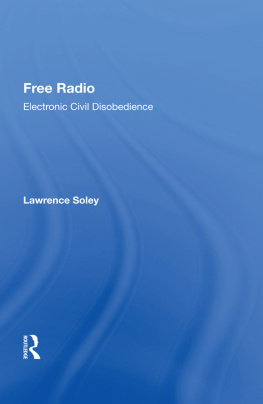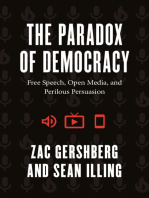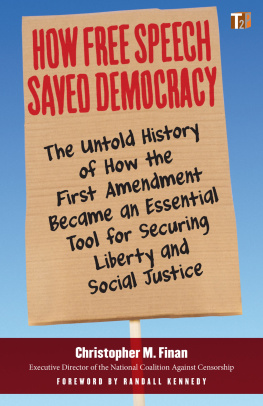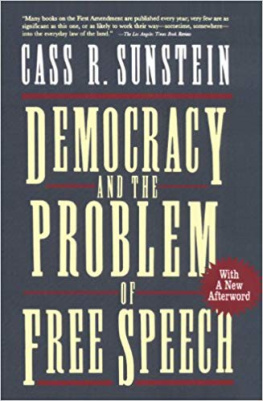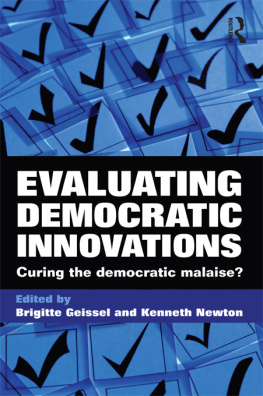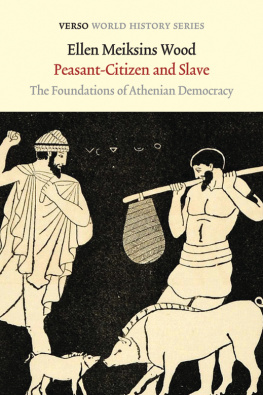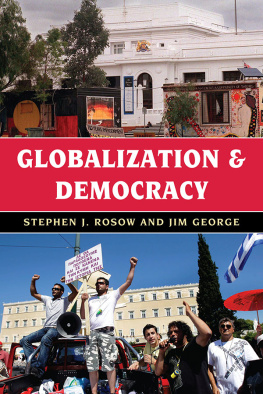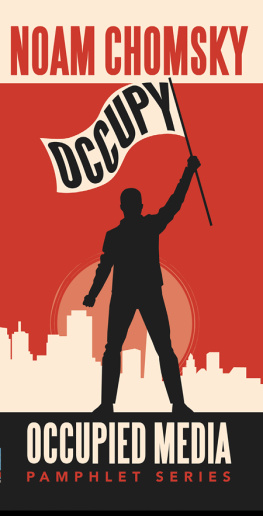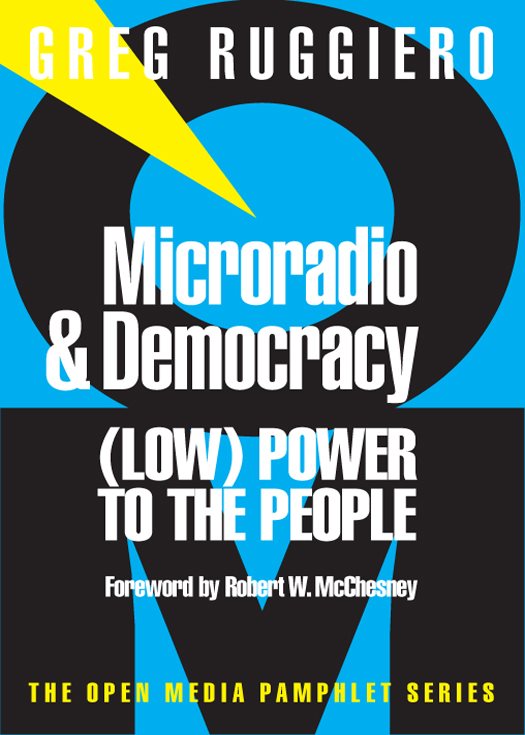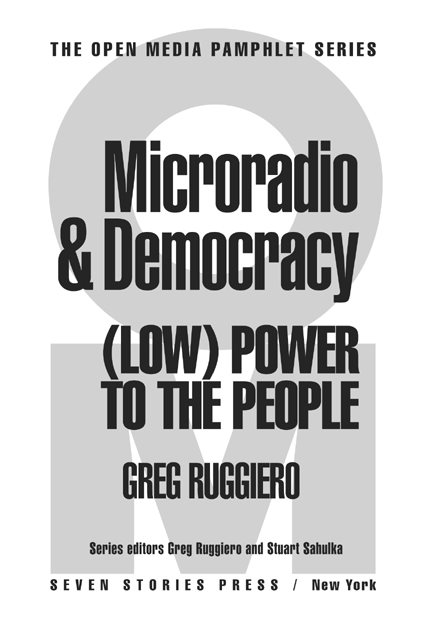THE OPEN MEDIA PAMPHLET SERIES
CORPORATE MEDIA AND THE THREAT TO DEMOCRACY
Robert W. McChesney
80 pages / $5.95 / ISBN: 1-888363-47-9
MEDIA CONTROL: THE SPECTACULAR ACHIEVEMENTS
OF PROPAGANDA Noam Chomsky
64 pages / $5.95 / ISBN: 1-888363-49-5
GENE WARS: THE POLITICS OF BIOTECHNOLOGY
Kristin Dawkins
64 pages / $4.95 / ISBN: 1-888363-48-7
GLOBALIZING CIVIL SOCIETY: RECLAIMING OUR RIGHT
TO POWER David C. Korten
80 pages / $5.95 / ISBN: 1-888363-59-2
ZAPATISTA ENCUENTRO: DOCUMENTS FROM THE
1996 ENCOUNTER FOR HUMANITY AND AGAINST NEOLIBERALISM
The Zapatistas
64 pages / $5.95 / ISBN: 1-888363-58-4
PROPAGANDA, INC.: SELLING AMERICAS CULTURE
TO THE WORLD Nancy Snow
80 pages / $5.95 / ISBN: 1-888363-74-6
A SUSTAINABLE ECONOMY FOR THE 21ST CENTURY
Juliet Schor
64 pages / $5.95 / ISBN: 1-888363-75-4
THE UMBRELLA OF U.S. POWER
Noam Chomsky
80 pages / $5.95 / 1-888363-85-1
THE CASE AGAINST LAMEDUCK IMPEACHMENT
Bruce Ackerman
80 pages / $8.00 / ISBN: 1-58322-004-6
ACTS OF AGGRESSION: POLICING ROGUE STATES
Noam Chomsky, Edward W. Said, Ramsey Clark
64 pages / $6.95 / ISBN: 1-58322-005-4
THE PROGRESSIVE GUIDE TO
ALTERNATIVE MEDIA AND ACTIVISM
Project Censored
144 pages / $10.00 / ISBN: 1-888363-84-3
TO ORDER ADDITIONAL SERIES TITLES CALL 1 (800) 596-7437
Copyright 1999 by Greg Ruggiero, Peter Franck, Robert W. McChesney
Earlier versions of Microradio & Democracy originally appeared in Z magazine, Project Censored Newsletter, Chicago Media Watch Newsletter, and LIP Magazine.
A Seven Stories Press First Edition,
published in association with Open Media.
Open Media Pamphlet Series editors,
Greg Ruggiero and Stuart Sahulka.
All rights reserved. No part of this book may be reproduced, stored in a retrieval system, or transmitted in any form, by any means, including mechanical, electric, photocopying, recording or otherwise, without the prior written permission of the publisher.
Library of Congress Cataloging-in-Publication Data
Ruggiero, Greg.
Microradio & Democracy / Greg Ruggiero.
p. cm. (The Open Media Pamphlet Series #10)
eISBN: 978-1-60980-260-8
1. Pirate radio broadcastingUnited States. 2.
Pirate radio broadcastingGovernment policyUnited
States. I. Title. II. Series.
HE8697.65 U6R84 1999
384.540973dc21 99-11326
v3.1
If there is no struggle, there
is no progress.
Those who profess freedom and
yet deprecate agitation are men
who want crops without plowing
up the ground. They want the rain
without thunder and lightning.
They want the ocean without the
awful roar of its many waters.
This struggle may be a moral one;
or it may be a physical one; or it
may be both moral and physical;
but it must be a struggle.
Power concedes nothing without
a demand.
FREDERICK DOUGLASS
Special thanks for feedback, ideas, criticism and support: Robert Perry, Peter Franck, Robert W. McChesney, Barbara Olshansky & The Center for Constitutional Rights, Dan Simon & Seven Stories Press, Jessica Glass, Mike Eisenmenger, Carlos Pareja, Paper Tiger Television Collective, Stephen Provizer, Kate Duncan, Flora Martins, Pete tri Dish, Sara Zia Ebrahimi, Diane Fleming, David Murphy, DJ Chrome, Ciani Mendez, Jesse Hirsch, Tamara Ford, Eric Galatas, Jay Sand, Stephen Dunifer, Lynn Gerry, Danny Schechter, Michael Manekin, Crystal and the National Commission for Democracy in Mexico, and all the radio rebels at Steal This Radio 88.7fm.
CONTENTS
Foreword
by Robert W. McChesney
Microradio & Democracy:
(Low) Power to the People
Appendix A
The Fight For Micro Radio Enters the
Home Stretch: Paradise or Paradise Lost?
by Peter Franck
Appendix B
What You Can Do
Appendix C
Excerpt from Phil Tymons First Draft of CDCs Comments to the FCCs Proposal
Appendix D
Microradio Contacts
FOREWORD
by Robert W. McChesney
A stunning transformation has overwhelmed and reconstructed U.S. radio broadcasting in the past few years. Since 1996 nearly one-half of the 11,000 commercial radio stations have been sold, almost always by smaller firms to medium sized firms, by medium sized firms to larger firms, and by large chains to a few massive powers that own hundreds of stations. At the top of the heap these few giants control some one-third of the market. With companies permitted to own up to eight stations in a single market, most U.S. communities find that their numerous radio stations are in fact owned predominantly by two or three firms.
This transformation of U.S. radio points to the absurdity of the notion that commercial broadcasting gives the people what they want. In fact this market power gives the radio giants the power to give the people whatever they can make the most profit from. So it is, across the United States, the new radio chains slash costs by reducing staff. After all, one technician or news reporter can service all eight of a firms stations in a market. And the radio giants use their holdings to better craft a product to serve advertisers, the people they really do try to give what they want. Hence radio is a leading element in the commercial carpetbombing of our society.
The situation is thick with irony. Radio is the least expensive electronic medium to use as a consumer. It is also quite inexpensive to produce quality fare for broadcast. It is, therefore, ideal for being a community based medium. At the hands of the radio giants, however, radio has become arguably the most centralized and regimented of our mass media. When a company owns rock stations in 50 markets, for example, it hardly needs music directors in 50 markets making extensive contacts with the local community. One playlist, sent from national headquarters, is much less expensive and easier to coordinate with national advertising sales.
The investment community is ecstatic about the massive profits these huge radio combines can generate; but there is no evidence that these profits are due to improved radio programming. Quite the contrary. Without wishing to romanticize the earlier age of radio, whatever semblance of radio being a creative medium, or a local medium, has pretty much been eliminated. Radio today has all the charm of a second-tier suburban shopping mall, if that. Sadly, public broadcasting, meaning for the most part the system of stations associated with National Public Radio, has been unable to fill the void. Encouraged to go commercial themselves, the public stations are kept on a short leash by the political right and have accepted a niche of serving a sliver of the upper-middle class with conventional news and classical music. It is a service decidedly of no interest to the bulk of Americans.
The nature of U.S. radio today also reveals the silliness of the notion that this brand of commercial broadcasting is the natural American system. There is nothing natural about it; it is the result of corrupt federal policies rammed through in almost complete secrecy by powerful lobbies. As a result, the commercial broadcasters receive licenses to broadcast on scarce publicly owned frequencies at no charge, a gift from the taxpayers to corporate America valued in the tens of billions of dollars. When Congress relaxed the ownership requirements in 1996 so companies could own eight stations in a single market, there was not a shred of public coverage or debate over the issue.


